牛津译林版(2019)必修第一册Unit 1Back to school Grammar and usage 课件(共27张PPT)
文档属性
| 名称 | 牛津译林版(2019)必修第一册Unit 1Back to school Grammar and usage 课件(共27张PPT) |  | |
| 格式 | pptx | ||
| 文件大小 | 575.3KB | ||
| 资源类型 | 教案 | ||
| 版本资源 | 牛津译林版(2019) | ||
| 科目 | 英语 | ||
| 更新时间 | 2024-01-23 19:48:06 | ||
图片预览

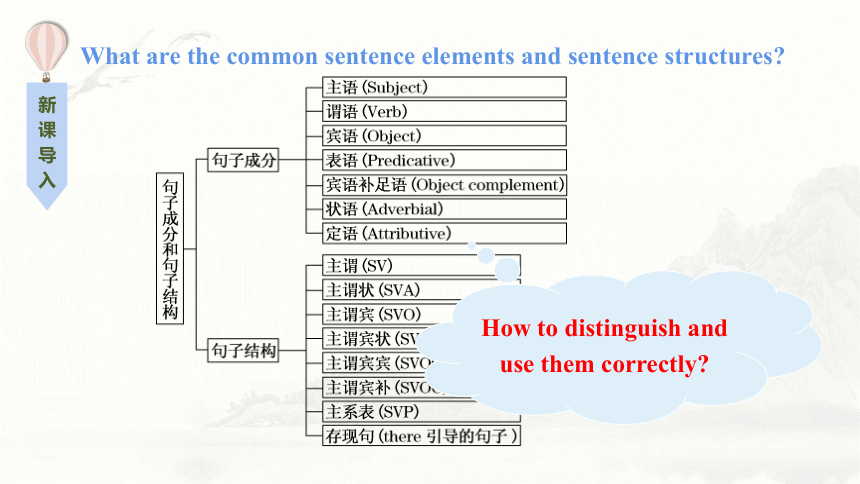
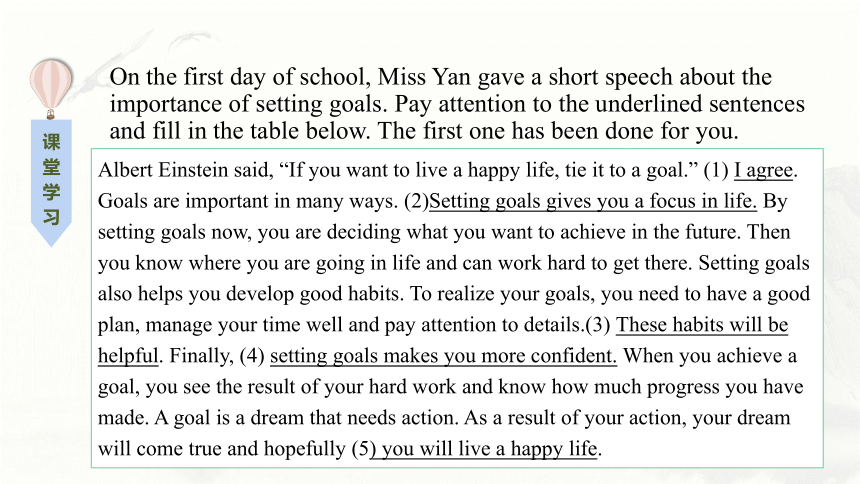
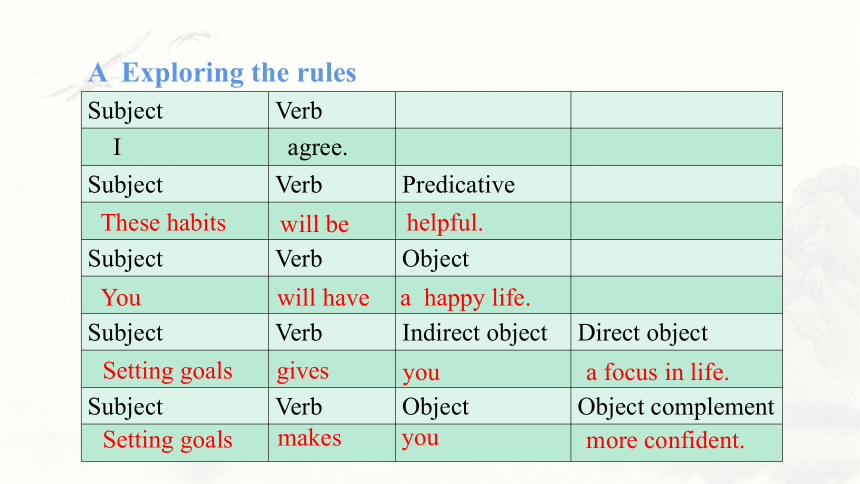
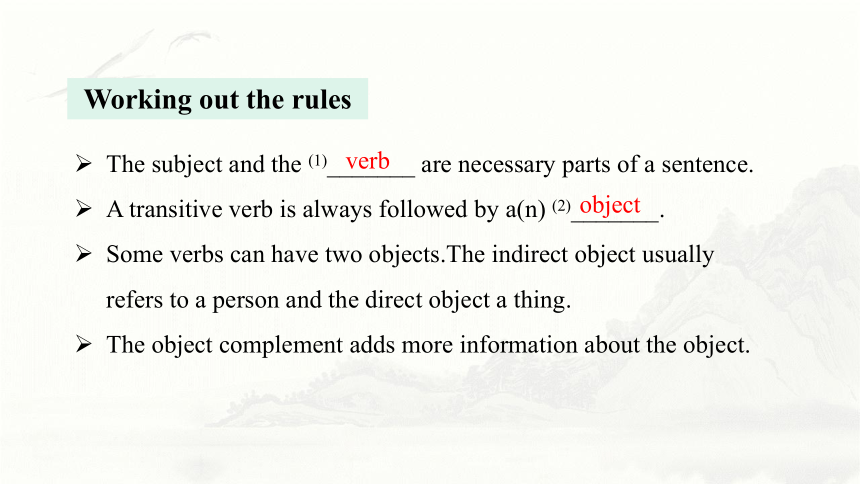
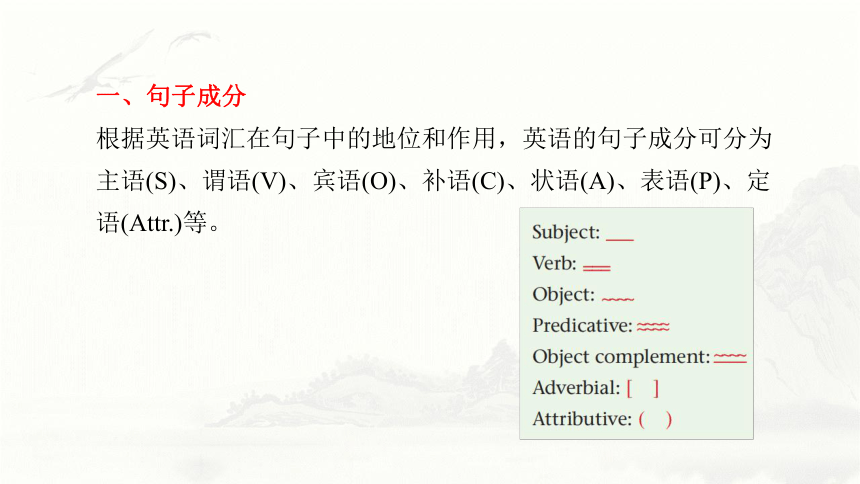

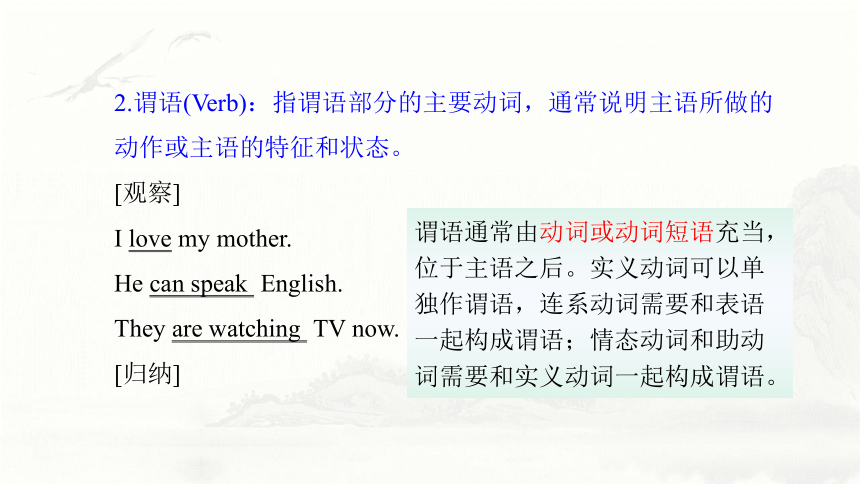
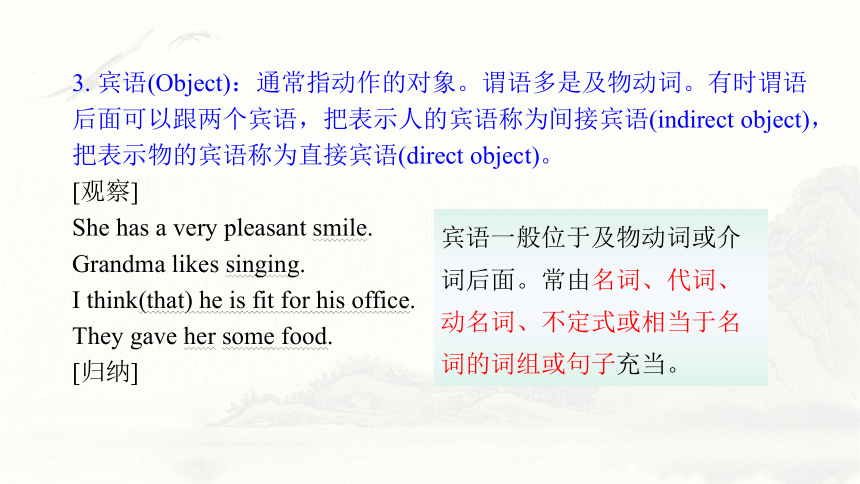
文档简介
(共27张PPT)
Unit 1
Period 2
Grammar and usage
新 课 导 入
What are the common sentence elements and sentence structures
How to distinguish and use them correctly
课 堂 学 习
On the first day of school, Miss Yan gave a short speech about the importance of setting goals. Pay attention to the underlined sentences and fill in the table below. The first one has been done for you.
Albert Einstein said, “If you want to live a happy life, tie it to a goal.” (1) I agree. Goals are important in many ways. (2)Setting goals gives you a focus in life. By setting goals now, you are deciding what you want to achieve in the future. Then you know where you are going in life and can work hard to get there. Setting goals also helps you develop good habits. To realize your goals, you need to have a good plan, manage your time well and pay attention to details.(3) These habits will be helpful. Finally, (4) setting goals makes you more confident. When you achieve a goal, you see the result of your hard work and know how much progress you have made. A goal is a dream that needs action. As a result of your action, your dream will come true and hopefully (5) you will live a happy life.
Subject Verb
I agree.
Subject Verb Predicative
Subject Verb Object
Subject Verb Indirect object Direct object
Subject Verb Object Object complement
These habits
will be
helpful.
You
will have
a happy life.
Setting goals
gives
you
a focus in life.
Setting goals
makes
you
more confident.
A Exploring the rules
Working out the rules
The subject and the (1)_______ are necessary parts of a sentence.
A transitive verb is always followed by a(n) (2)_______.
Some verbs can have two objects.The indirect object usually refers to a person and the direct object a thing.
The object complement adds more information about the object.
verb
object
一、句子成分
根据英语词汇在句子中的地位和作用,英语的句子成分可分为主语(S)、谓语(V)、宾语(O)、补语(C)、状语(A)、表语(P)、定语(Attr.)等。
1. 主语(Subject): 指句子所谈论的主体。
[观察]
John is good at playing football.
He went out in a hurry.
To rise early is a good habit.
Smoking is bad for health.
[归纳]
主语表示句子说的是什么人或什么事。通常由名词、代词、数词、名词化的形容词、动词不定式、动名词、从句等充当。
2.谓语(Verb):指谓语部分的主要动词,通常说明主语所做的动作或主语的特征和状态。
[观察]
I love my mother.
He can speak English.
They are watching TV now.
[归纳]
谓语通常由动词或动词短语充当,位于主语之后。实义动词可以单独作谓语,连系动词需要和表语一起构成谓语;情态动词和助动词需要和实义动词一起构成谓语。
3. 宾语(Object):通常指动作的对象。谓语多是及物动词。有时谓语后面可以跟两个宾语,把表示人的宾语称为间接宾语(indirect object),把表示物的宾语称为直接宾语(direct object)。
[观察]
She has a very pleasant smile.
Grandma likes singing.
I think(that) he is fit for his office.
They gave her some food.
[归纳]
宾语一般位于及物动词或介词后面。常由名词、代词、动名词、不定式或相当于名词的词组或句子充当。
4.表语(Predicative):指连系动词后面的成分,通常说明主语的身份、特征和状态。
[观察]
My father is a professor.
His words sounded reasonable.
She is in the room alone.
[归纳]
表语一般位于系动词之后,由形容词、名词、代词、分词、数词、不定式、动名词、介词短语、副词或句子充当。常见系动词有be, become, feel, get, look, seem等。
5.补语(Complement):补语分为宾语补足语和主语补足语,用来补充说明宾语或主语的特征或情况。
[观察]
[归纳]
补语是补充说明宾语或主语的成分。一般由形容词、名词、副词、动词不定式、分词和介词短语等充当。
6.状语(Adverbial):修饰动词、形容词、副词或整个句子。
[观察]
The old man walks [slowly].
I'll be back [in a while].
[If it doesn't rain], we'll go camping tomorrow.
[归纳]
状语修饰说明动作或状态特征。一般由副词、形容词、不定式、分词、介词短语、从句等充当。
7.定语(Attributive):修饰名词或代词。
[观察]
The (tall) boy is my cousin.
The girl (on the bike) is my sister.
Rose is the person (whom you should care about).
[归纳]
定语修饰说明名词或代词。一般由形容词、介词短语、不定式、分词、从句等充当。
二、句子结构
1. 主谓:主语+谓语(不及物动词)(SV)
[观察]
The door opened.
主语 谓语
The red sun is rising.
主语 谓语
[归纳]
在此句型中,谓语为不及物动词,
不能接宾语,但能表达完整的意义。
常见的不及物动词(短语)有:
rise, matter, begin, come, go,
happen, appear, work, take place。
2.主系表:主语+系动词+表语(SVP)
[观察]
Some girls are very excited.
主语 系动词 表语
The flower smells sweet.
主语 系动词 表语
The baby fell asleep soon.
主语 系动词 表语
My father's hope is that I can go home frequently.
主语 系动词 表语
[归纳]
(1)在此句型中,谓语动词必须加一个表明主语身份或状态的表语构成复合谓语,才能表达完整意思。这类动词叫作连系动词。
(2)此类动词大致分四类:
①“状态”类:be, keep, remain, stay;
②“感官”类:look, sound, feel, smell, taste等;
③“变成”类:get, grow, become, turn, go, fall, come等;
④“结果”类:prove, turn out等。
(3)表语由名词、形容词、介词短语、分词、不定式或从句充当。
3.主谓宾:主语+谓语(及物动词)+宾语(SVO)
[观察]
My father teaches English.
主语 谓语 宾语
We all know that the earth runs around the sun.
主语 谓语 宾语
[归纳]
在此句型中,谓语为及物动词或相当于及物动词的短语动词,它必须跟一个宾语,即动作的承受者,才能表达一个完整的意思。用作宾语的有名词、代词、数词、不定式、动名词和从句等。
4.主谓宾宾:主语+谓语+间接宾语+直接宾语(SVOO)
[观察]
Mr Smith lent me his car. =Mr Smith lent his car to me.
主语 谓语 间接宾语 直接宾语
He gave me an apple. =He gave an apple to me.
主语 谓语 间接宾语 直接宾语
He offered me his seat. =He offered his seat to me.
主语 谓语 间接宾语 直接宾语
Father bought me a book. =Father bought a book for me.
主语 谓语 间接宾语 直接宾语
[归纳]
(1)在此句型中,谓语动词带两个宾语(双宾语),前一个为间接宾语(通常指人),后一个为直接宾语(通常指物)。如果要把直接宾语提前,就需要加适当的介词。即:“主+谓+间宾+直宾”或“主+谓+直宾+to/for+间宾”结构。
(2)间接宾语之前用介词to的动词有:give, tell, teach, write, bring, lend, hand, show, offer, send, pay, order。
(3)间接宾语之前用介词for的动词有:buy,fetch, save, choose, sing等。
5.主谓宾补:主语+谓语+宾语+宾语补足语(SVOC)
[归纳]
(1) 此句型的特点是:此类及物动词后面,要用一个“宾语+宾语补足语”,才能使意思完整。
(2) 作宾语补足语的可以是形容词、副词、介词短语、现在分词、过去分词、不定式等。
(3) 该句式常用于三类动词:①使役动词keep, make, let, have, leave, get等;②感官动词see, watch, notice, observe, find, catch, look at, listen to, hear, feel, smell等;③ask/tell/order/request/permit/persuade/ ...sb to do sth。
Tip
如何判断一个及物动词所带的是双宾语还是复合宾语?
如果宾语与其后的成分之间存在着逻辑上的主谓或主表关系,则该动词接的是复合宾语,否则就是双宾语。
6.主谓状:主语+谓语+状语(SVA)
[观察]
All the students are listening [carefully].
主语 谓语 状语
Robot cooks will appear [in our families] [in the future].
主语 谓语 地点状语 时间状语
[When her mother came in], she was sleeping.
状语 主语 谓语
[归纳]
在此句型中,谓语也为不及物动词,但其后必须接副词、介词短语、不定式等作状语,否则结构不全,意义不完整。可以用作状语的有:副词、形容词、不定式、分词、介词短语、从句等。
7. 主谓宾状:主语+谓语+宾语+状语(SVOA)
[观察]
Jane was doing her homework [at 8:00 last night].
主语 谓语 宾语 状语
The man raised his arms [above his head].
主语 谓语 宾语 状语
[归纳]
此句型是在句型主谓宾 SVO 的基础上, 加
副词、介词短语、分词、从句等作状语。
8. 存现句: 引导词there引导的句子
[观察]
There is a small pool [at the foot of the mountain].
谓语 主语 状语
There aren't some students [in the dormitory] [now].
谓语 主语 地点状语 时间状语
[归纳]
(1) “There be句型”表示“某处存在某物/某人”,因此被称为存现句。其基本句型是“there+be+主语+其他(状语、定语等)”。
(2) there在该结构中是个引导词,本身无词义。动词be是谓语动词,有时态变化,也可与情态动词连用。动词be要和后面的就近的主语保持单复数方面的一致。
Mark the different elements of each sentence with different symbols. Use the example below to help you.
B1
B Applying the rules
1. You will find (senior high) school different from (junior high) school.
2. (Your) schoolwork will be more challenging.
3. We will give you (more) independence.
4. You should listen [more carefully].
5. You can join a club.
6. (Your) teachers will help you [in (many) ways].
7. You will succeed!
Below are some tips about setting goals. Match the underlined sentences with the correct structures. Write the letters in the boxes.
B2
a SV b SVP c SVO d SVOO e SVOC f SVA g SVOA
Setting goals is the first step in achieving them. (1) The tips below may help you.( )
Set goals that can be achieved. Don't push yourself to achieve more than what is possible. Instead, you should set goals based on your abilities and skills.
Break big goals down into small ones. When you do so, (2) they will seem easier to reach.( ) You will be proud of yourself when you realize each small goal. (3) This will also give you the encouragement to achieve your long-term goal.( )
Write your goals on paper. It is a good idea to put your goals where you can see them. (4) You can place the list on your bedside table.( ) Or you can stick it on your bedroom wall. This will remind you of what you are working for and keep you focused.
After you set a goal, it is important to stick to it and work hard towards it. (5) You may find achieving goals difficult.( ) But (6) you should not give up.( ) Instead, stay positive and confident. (7) You will succeed in the end.( )
c
b
d
g
e
a
f
What is your goal for the new term How are you going to achieve your goal Write about it using different sentence structures.
B3
I will try to improve my English in the new term. There are a lot of things I need to do to achieve this goal. I will read two English novels this term. I will also try to find a language partner. Joining the English club will be helpful to me too. All my efforts will pay off!
Example
Speaking in public confidently remains a challenge to me. I find it difficult to speak in public confidently. My goal for the new term is to improve my communication skills. To achieve this goal, I will encourage myself to ask and answer more questions. Joining a club also seems a great idea. I think it can offer me a good opportunity to make new friends and acquire new skills. Besides, I will read a book on how to improve communication skills. Always try hard and I will succeed!
A sample
Now can you list sentence elements and sentence structures
or distinguish them correctly
Unit 1
Period 2
Grammar and usage
新 课 导 入
What are the common sentence elements and sentence structures
How to distinguish and use them correctly
课 堂 学 习
On the first day of school, Miss Yan gave a short speech about the importance of setting goals. Pay attention to the underlined sentences and fill in the table below. The first one has been done for you.
Albert Einstein said, “If you want to live a happy life, tie it to a goal.” (1) I agree. Goals are important in many ways. (2)Setting goals gives you a focus in life. By setting goals now, you are deciding what you want to achieve in the future. Then you know where you are going in life and can work hard to get there. Setting goals also helps you develop good habits. To realize your goals, you need to have a good plan, manage your time well and pay attention to details.(3) These habits will be helpful. Finally, (4) setting goals makes you more confident. When you achieve a goal, you see the result of your hard work and know how much progress you have made. A goal is a dream that needs action. As a result of your action, your dream will come true and hopefully (5) you will live a happy life.
Subject Verb
I agree.
Subject Verb Predicative
Subject Verb Object
Subject Verb Indirect object Direct object
Subject Verb Object Object complement
These habits
will be
helpful.
You
will have
a happy life.
Setting goals
gives
you
a focus in life.
Setting goals
makes
you
more confident.
A Exploring the rules
Working out the rules
The subject and the (1)_______ are necessary parts of a sentence.
A transitive verb is always followed by a(n) (2)_______.
Some verbs can have two objects.The indirect object usually refers to a person and the direct object a thing.
The object complement adds more information about the object.
verb
object
一、句子成分
根据英语词汇在句子中的地位和作用,英语的句子成分可分为主语(S)、谓语(V)、宾语(O)、补语(C)、状语(A)、表语(P)、定语(Attr.)等。
1. 主语(Subject): 指句子所谈论的主体。
[观察]
John is good at playing football.
He went out in a hurry.
To rise early is a good habit.
Smoking is bad for health.
[归纳]
主语表示句子说的是什么人或什么事。通常由名词、代词、数词、名词化的形容词、动词不定式、动名词、从句等充当。
2.谓语(Verb):指谓语部分的主要动词,通常说明主语所做的动作或主语的特征和状态。
[观察]
I love my mother.
He can speak English.
They are watching TV now.
[归纳]
谓语通常由动词或动词短语充当,位于主语之后。实义动词可以单独作谓语,连系动词需要和表语一起构成谓语;情态动词和助动词需要和实义动词一起构成谓语。
3. 宾语(Object):通常指动作的对象。谓语多是及物动词。有时谓语后面可以跟两个宾语,把表示人的宾语称为间接宾语(indirect object),把表示物的宾语称为直接宾语(direct object)。
[观察]
She has a very pleasant smile.
Grandma likes singing.
I think(that) he is fit for his office.
They gave her some food.
[归纳]
宾语一般位于及物动词或介词后面。常由名词、代词、动名词、不定式或相当于名词的词组或句子充当。
4.表语(Predicative):指连系动词后面的成分,通常说明主语的身份、特征和状态。
[观察]
My father is a professor.
His words sounded reasonable.
She is in the room alone.
[归纳]
表语一般位于系动词之后,由形容词、名词、代词、分词、数词、不定式、动名词、介词短语、副词或句子充当。常见系动词有be, become, feel, get, look, seem等。
5.补语(Complement):补语分为宾语补足语和主语补足语,用来补充说明宾语或主语的特征或情况。
[观察]
[归纳]
补语是补充说明宾语或主语的成分。一般由形容词、名词、副词、动词不定式、分词和介词短语等充当。
6.状语(Adverbial):修饰动词、形容词、副词或整个句子。
[观察]
The old man walks [slowly].
I'll be back [in a while].
[If it doesn't rain], we'll go camping tomorrow.
[归纳]
状语修饰说明动作或状态特征。一般由副词、形容词、不定式、分词、介词短语、从句等充当。
7.定语(Attributive):修饰名词或代词。
[观察]
The (tall) boy is my cousin.
The girl (on the bike) is my sister.
Rose is the person (whom you should care about).
[归纳]
定语修饰说明名词或代词。一般由形容词、介词短语、不定式、分词、从句等充当。
二、句子结构
1. 主谓:主语+谓语(不及物动词)(SV)
[观察]
The door opened.
主语 谓语
The red sun is rising.
主语 谓语
[归纳]
在此句型中,谓语为不及物动词,
不能接宾语,但能表达完整的意义。
常见的不及物动词(短语)有:
rise, matter, begin, come, go,
happen, appear, work, take place。
2.主系表:主语+系动词+表语(SVP)
[观察]
Some girls are very excited.
主语 系动词 表语
The flower smells sweet.
主语 系动词 表语
The baby fell asleep soon.
主语 系动词 表语
My father's hope is that I can go home frequently.
主语 系动词 表语
[归纳]
(1)在此句型中,谓语动词必须加一个表明主语身份或状态的表语构成复合谓语,才能表达完整意思。这类动词叫作连系动词。
(2)此类动词大致分四类:
①“状态”类:be, keep, remain, stay;
②“感官”类:look, sound, feel, smell, taste等;
③“变成”类:get, grow, become, turn, go, fall, come等;
④“结果”类:prove, turn out等。
(3)表语由名词、形容词、介词短语、分词、不定式或从句充当。
3.主谓宾:主语+谓语(及物动词)+宾语(SVO)
[观察]
My father teaches English.
主语 谓语 宾语
We all know that the earth runs around the sun.
主语 谓语 宾语
[归纳]
在此句型中,谓语为及物动词或相当于及物动词的短语动词,它必须跟一个宾语,即动作的承受者,才能表达一个完整的意思。用作宾语的有名词、代词、数词、不定式、动名词和从句等。
4.主谓宾宾:主语+谓语+间接宾语+直接宾语(SVOO)
[观察]
Mr Smith lent me his car. =Mr Smith lent his car to me.
主语 谓语 间接宾语 直接宾语
He gave me an apple. =He gave an apple to me.
主语 谓语 间接宾语 直接宾语
He offered me his seat. =He offered his seat to me.
主语 谓语 间接宾语 直接宾语
Father bought me a book. =Father bought a book for me.
主语 谓语 间接宾语 直接宾语
[归纳]
(1)在此句型中,谓语动词带两个宾语(双宾语),前一个为间接宾语(通常指人),后一个为直接宾语(通常指物)。如果要把直接宾语提前,就需要加适当的介词。即:“主+谓+间宾+直宾”或“主+谓+直宾+to/for+间宾”结构。
(2)间接宾语之前用介词to的动词有:give, tell, teach, write, bring, lend, hand, show, offer, send, pay, order。
(3)间接宾语之前用介词for的动词有:buy,fetch, save, choose, sing等。
5.主谓宾补:主语+谓语+宾语+宾语补足语(SVOC)
[归纳]
(1) 此句型的特点是:此类及物动词后面,要用一个“宾语+宾语补足语”,才能使意思完整。
(2) 作宾语补足语的可以是形容词、副词、介词短语、现在分词、过去分词、不定式等。
(3) 该句式常用于三类动词:①使役动词keep, make, let, have, leave, get等;②感官动词see, watch, notice, observe, find, catch, look at, listen to, hear, feel, smell等;③ask/tell/order/request/permit/persuade/ ...sb to do sth。
Tip
如何判断一个及物动词所带的是双宾语还是复合宾语?
如果宾语与其后的成分之间存在着逻辑上的主谓或主表关系,则该动词接的是复合宾语,否则就是双宾语。
6.主谓状:主语+谓语+状语(SVA)
[观察]
All the students are listening [carefully].
主语 谓语 状语
Robot cooks will appear [in our families] [in the future].
主语 谓语 地点状语 时间状语
[When her mother came in], she was sleeping.
状语 主语 谓语
[归纳]
在此句型中,谓语也为不及物动词,但其后必须接副词、介词短语、不定式等作状语,否则结构不全,意义不完整。可以用作状语的有:副词、形容词、不定式、分词、介词短语、从句等。
7. 主谓宾状:主语+谓语+宾语+状语(SVOA)
[观察]
Jane was doing her homework [at 8:00 last night].
主语 谓语 宾语 状语
The man raised his arms [above his head].
主语 谓语 宾语 状语
[归纳]
此句型是在句型主谓宾 SVO 的基础上, 加
副词、介词短语、分词、从句等作状语。
8. 存现句: 引导词there引导的句子
[观察]
There is a small pool [at the foot of the mountain].
谓语 主语 状语
There aren't some students [in the dormitory] [now].
谓语 主语 地点状语 时间状语
[归纳]
(1) “There be句型”表示“某处存在某物/某人”,因此被称为存现句。其基本句型是“there+be+主语+其他(状语、定语等)”。
(2) there在该结构中是个引导词,本身无词义。动词be是谓语动词,有时态变化,也可与情态动词连用。动词be要和后面的就近的主语保持单复数方面的一致。
Mark the different elements of each sentence with different symbols. Use the example below to help you.
B1
B Applying the rules
1. You will find (senior high) school different from (junior high) school.
2. (Your) schoolwork will be more challenging.
3. We will give you (more) independence.
4. You should listen [more carefully].
5. You can join a club.
6. (Your) teachers will help you [in (many) ways].
7. You will succeed!
Below are some tips about setting goals. Match the underlined sentences with the correct structures. Write the letters in the boxes.
B2
a SV b SVP c SVO d SVOO e SVOC f SVA g SVOA
Setting goals is the first step in achieving them. (1) The tips below may help you.( )
Set goals that can be achieved. Don't push yourself to achieve more than what is possible. Instead, you should set goals based on your abilities and skills.
Break big goals down into small ones. When you do so, (2) they will seem easier to reach.( ) You will be proud of yourself when you realize each small goal. (3) This will also give you the encouragement to achieve your long-term goal.( )
Write your goals on paper. It is a good idea to put your goals where you can see them. (4) You can place the list on your bedside table.( ) Or you can stick it on your bedroom wall. This will remind you of what you are working for and keep you focused.
After you set a goal, it is important to stick to it and work hard towards it. (5) You may find achieving goals difficult.( ) But (6) you should not give up.( ) Instead, stay positive and confident. (7) You will succeed in the end.( )
c
b
d
g
e
a
f
What is your goal for the new term How are you going to achieve your goal Write about it using different sentence structures.
B3
I will try to improve my English in the new term. There are a lot of things I need to do to achieve this goal. I will read two English novels this term. I will also try to find a language partner. Joining the English club will be helpful to me too. All my efforts will pay off!
Example
Speaking in public confidently remains a challenge to me. I find it difficult to speak in public confidently. My goal for the new term is to improve my communication skills. To achieve this goal, I will encourage myself to ask and answer more questions. Joining a club also seems a great idea. I think it can offer me a good opportunity to make new friends and acquire new skills. Besides, I will read a book on how to improve communication skills. Always try hard and I will succeed!
A sample
Now can you list sentence elements and sentence structures
or distinguish them correctly
